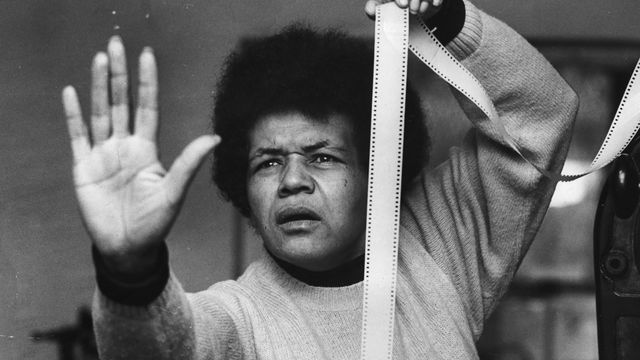
Sarah Maldoror: Through a Lens of Resistance and Rebellion
- This is a past program
This program is presented by the UCLA Film & Television Archive.
In-person: Q&A with producer and distributor Annouchka de Andrade, daughter of Sarah Maldoror, and UCLA Associate Professor Ellen C. Scott.
On April 13, 2020, 90-year-old filmmaker, theater artist and mother Sarah Maldoror passed away due to complications from the coronavirus. The African diasporic film director has been remembered in various posthumous celebrations of her life, and her creative force has become a singular subject of collective rediscovery thanks to the front-running curatorial sense of feminist film publication Another Gaze coupled with the efforts of Maldoror’s daughter Annouchka de Andrade, who has tirelessly labored to preserve and share her mother’s legacy.
Born Sarah Durados in rural, southwestern France to parents of West Indian and French descent, the multidimensional maker was initially drawn to the Parisian theater scene where, in 1956, she co-founded one of France’s first Black theater troupes in collaboration with other artists of the African diaspora. Half a decade later she pivoted her creative focus to cinema, first studying filmmaking under Soviet director Mark Donskoy in 1961 before working as assistant director to Gillo Pontecorvo on The Battle of Algiers (1966), a milestone of revolutionary cinema. Claiming that Black artists “are the only ones who should tell our history,” Maldoror — who changed her last name after an inspirational encounter with the 19th century poem, Les Chants de Maldoror — would forge her own visual transmissions of African culture by directing over two dozen films, including documentaries, fiction shorts, and feature-length narrative and television films.
The Archive is honored to screen three of Sarah Maldoror’s markedly distinct works created for cinema and broadcast television. Presented in dialogue with each other, the three works construct a nuanced portrait of Maldoror’s unique formal, social and political concerns.
Et les chiens se taisaient (And the Dogs Kept Silent, 1978)
Sarah Maldoror directs Aimé Césaire's tragic poem, in which she stars alongside Gabriel Glissant. Filmed in the storerooms of the Musée de l'Homme in Paris that brim with African art plundered by colonists, Maldoror’s expressionistic drama finds a mother attempting to save her rebellious son from enslavement. Restored version.
DCP, color, in French with English subtitles, 13 min. Production: CNRS and les films de l’Homme. Director: Sarah Maldoror. Writer: Aimé Césaire. With: Gabriel Glissant, Sarah Maldoror.
Un dessert pour Constance (Dessert for Constance, 1981)
This subversive comedy follows a 19th century cookbook from a stuffy Parisian auction house to a trash bin, where it is discovered by waste workers and taken home to the living space they share with several other Senegalese émigrés. When their friend falls ill and wishes to return to Senegal, the contents of the book become an opportunity to win the fee for his passage on a television game show. The brilliant telefilm finds Maldoror expertly utilizing comedy as a means to challenge racist stereotypes and outdated nationalist ideas.
DCP, color, in French with English subtitles, 52 min. Production: Top Film. Director: Sarah Maldoror. Screenwriter: Maurice Pons. Based on a story by: Daniel Boulanger. With: Sidiki Bakaba, Cheik Doukouré, Elias Sherif.
The UCLA Film & Television Archive is a division of UCLA Library, and presents its public programs in the Billy Wilder Theater at the Hammer, among other venues. For more information about the Archive, visit cinema.ucla.edu.
ATTENDING THIS PROGRAM?
Ticketing: Admission to Archive screenings at the Hammer is free. Your seat will be assigned to you when you pick up your ticket at the box office. Seats are assigned on a first come, first served basis, limit one per visitor. Box office opens one hour before the event. Questions should be directed to the Archive at programming@cinema.ucla.edu or 310-206-8013.
Member Benefit: Subject to availability, Hammer Members can choose their preferred seats and pick up tickets for one additional guest. Members receive priority ticketing until 15 minutes before the program. Learn more about membership.
Parking: Self-parking is available under the museum. Rates are $8 for the first three hours with museum validation, and $3 for each additional 20 minutes, with a $22 daily maximum. There is an $8 flat rate after 5 p.m. on weekdays, and all day on weekends.
Read our food, bag check, and photo policies.
Read our COVID-19 safety guidelines.


